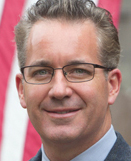
As agents and advisors, we show up without sirens or headlights with checks to help rebuild lives.
The other day from my office window, about a mile away, I saw a huge plume of black smoke billowing up to the sky. You probably have had the same experience, and you thought to yourself, I hope no one is hurt. I hope everything is OK because it doesn’t look OK. Seconds later you see the usual cast of first responders speed by to the rescue.
The entire world has now dealt with the COVID-19 pandemic. And it was extraordinary. The fire a mile from my office took a few minutes to consume that home, just as the COVID-19 virus has consumed the pattern of everyday living.
I remember other seminal moments in my adult life that interrupted the order and priorities of work, travel and school: September 11, the wildfires in California, Hurricane Katrina and the catastrophic Midwest floods in 2019.
With each crisis, there is a group of people and professions who respond. We know them as our first responders.
They show up in the everyday course of life:
- In a call from your doctor with positive test results
- To the car accident at the intersection
- To the fire that ravages your home or business
- To the downed power lines that supply your neighborhood with electricity
- To an office building to protect employees from workplace violence
In moments of national, regional and personal crisis, first responders are the first to show up.
We are the second responders: the insurance agents and financial advisors. We show up on the scene around the time headlines fade or when the family is back from the hospital or morgue. We arrive on the scene as the second responders, without sirens or lights.
The COVID-19 pandemic has lifted our collective gratitude and respect for our first responders.
But don’t think we are not playing a vital role because we are not making headlines on cable news. That’s not our part. That’s not how our profession plays out. We don’t hop into the back of an ambulance to deliver life-saving measures for someone in cardiac arrest. We deliver the money to keep the family in their home, food on the table and medical bills paid. And in this COVID-19 international crisis, we are responding to frightened clients who have been bombarded with the incessant headlines of economic doom and collapse.
“The market is in a free fall!” We counsel our clients on guaranteed income and diversification.
“I lost my job. How will I pay my bills?” We provide safety nets with dividend-paying, cash-value life insurance and six months of cash reserves.
It is our professionally trained wisdom and experience that provide clients hope, rational thinking and peace of mind. Oftentimes, we are not just responding a second time, but a third and fourth time through the trials and tribulations of their life.
Now, I do not mean that our second responders’ work is better than that of the heroic front-line first responders. It’s different. However, our work is just as important.
A first responder can say, “I just saved that man’s life!”
As second responders, we can proudly say, “We’ll take it from here.”

Adam A. Solano Jr., CRPC, began his career in the financial services industry with MassMutual in 1993, later branding his practice under Lakeside Financial Group. Solano is immediate past president of his local and state professional associations and has written several articles for industry trade magazines. He has appeared on WTTW’s “Chicago Tonight” to discuss the industry’s fiduciary rule and its impact on advisors and clients.